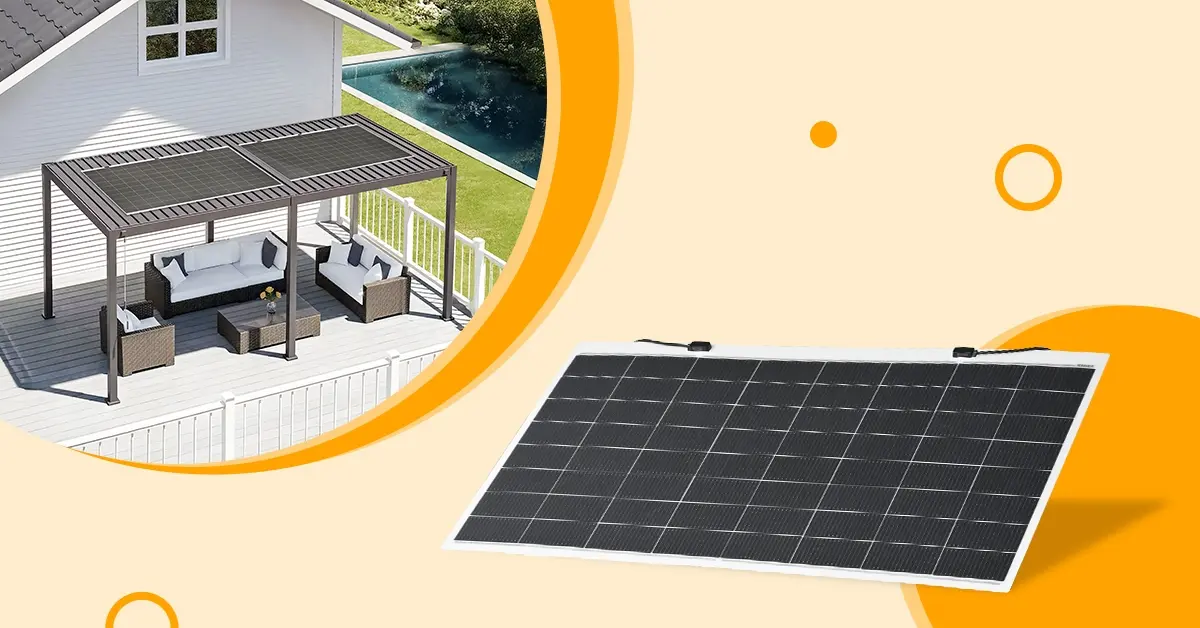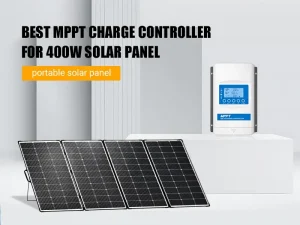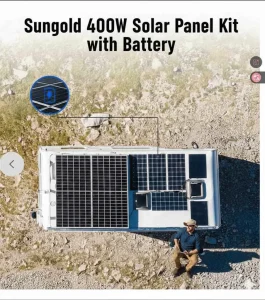If you’ve ever eyed a curved roof, off-grid cabin, boat deck or caravan and thought, “Could I just stick a panel on that and call it done?”, then you’ve likely come across the term flexible solar panels.
These lightweight, bendable modules promise to make solar installs easier in tricky spots. But here’s the thing: not all flexible solar panels are created equal, and by 2025, the landscape has shifted quite a bit. In this blog, we’ll unpack exactly what a “flexible solar panel” means, how they differ from the traditional rigid type, and whether they’re a smart buy now.
We’ll also look at real-world use cases (camping, 12 V systems, curved surfaces), what a good flexible solar panel manufacturer and flexible solar panel supplier should deliver, and crucially, whether the trade-offs are worth it.
So if you’re considering a flexible portable solar panel for your setup, read on. This will help you avoid buyer’s regret and make a decision you’ll feel good about.
Key Takeaways
- Flexible solar panels shine in mobile/curved/12 V setups, but come with lower efficiency and shorter warranties than rigid modules.
- A good flexible solar panel manufacturer will clearly state specs (weight, bending radius, efficiency, warranty) and match the panel to your system (eg, 12 volt flexible solar panels for camping).
- Before you pick up one of those slick “stick on your van roof” panels, check the real-world durability, mounting method and return on investment.
- For fixed rooftop installations, the traditional rigid glass panels still often offer better value. What this really means is: match the tech to the job, don’t pick flexible just for the novelty.
What exactly are flexible solar panels?
At their core, flexible solar panels are PV modules designed to bend (to some degree) or conform to non-flat surfaces, and usually weigh much less than typical framed glass modules. Let’s break it down:
- Traditional modules: crystalline silicon cells, sandwiched under tempered glass, framed in aluminium, mounted on fixed roofs.
- Flexible type: thinner substrate, often laminated with polymer (such as ETFE), sometimes mounted on a flexible core like FRP (fibre-reinforced plastic). They drop the heavy glass and frame so you can stick them on curved surfaces or where weight matters.
- Example specs: The company Sungold Solar lists a model “TF-S-120W” that weighs only 1.63 kg and has a thickness of 2 mm, explicitly designed for RVs/boats.
- They can be used for 12-volt flexible solar panel systems (important for camper vans, off-grid cabins, small battery banks) or in modular strings for larger setups.
In short, flexible panels open up installation sites that rigid panels struggle with, tents, curved hulls, and portable kits. But the question is: do they perform well enough?
Advantages and where they shine
Here’s where flexible solar panels really make sense:
Mobility & curved surfaces
If you’re running a boat, yacht or motorhome, or you have a curved roof (e.g., some vans, tiny houses, special architectural surfaces), these panels reduce weight, fit odd shapes, and avoid the heavy mounts required for glass-framed modules.
Low-weight installations
For rooftop setups where structure or weight is a concern (for example, balconies, tents, temporary shelters), a lighter, flexible panel may eliminate the need for heavy mounting hardware. If you’re camping or using in remote places, a flexible portable solar panel is much easier to transport, install and store.
Specific off-grid / 12 V use cases
If you’re using a 12 V battery bank (common in camper-van, boat or portable solar systems), you’ll often find flexible solar panels 12 V rated or adaptable to those systems. For example, some flexible panels from Sungold list appropriate specs for “12 V battery charging” setups.
Rapid deployment and minimal mounting
Some flexible panels stick onto surfaces with adhesives or VHB tape, avoiding drilling, racking and heavy labour. That makes them useful for temporary setups or where you want minimal installation fuss.
Downsides and what to watch
Here’s what you need to be realistic about, so you don’t walk into the project blind.
Lower efficiency & smaller warranty
Flexible modules often have lower conversion efficiency compared to rigid, framed glass modules. For example, many flexible panels operate around 22-24% at best (high end) but often less. The TF-S-165W from Sungold lists efficiency up to 24.4%.
But framed rigid modules commonly go higher, and warranty terms for flexible panels are often shorter (e.g., 5-10 years) compared to 25+ years for rigid. That means your long-term return may suffer.
Durability concerns
Without a heavy frame and thick glass cover, flexible panels might suffer more from mechanical stress, vibration, heat buildup, and environmental wear. For instance, they may be more prone to micro-cracks, and thermal management can be less effective (less air gap, more heat), which may reduce output. A table comparing options helps:
Type | Weight/Thickness | Efficiency Typical | Warranty / Life |
Flexible solar panel | Very light (a few mm thick) | ~20-24% typical | 5-10 years typical |
Rigid-framed glass module | Heavier, thicker | ~20-22% often higher | 20-25 years or more |
Thin-film flexible (alternate tech) | Ultra-light, much lower efficiency | ~10-14% typical | Often shorter life |
ROI and location constraints
If you’re installing on a fixed roof that allows standard panels, you may find the payback slower with flexible panels because you’re trading durability or efficiency for install convenience. Also, flexible panels may not handle extreme weather (heavy snow, strong hail) as well as framed modules.
Recent developments in 2025: What’s changed?
s we move into 2025, there are a few important shifts:
- Some manufacturers (including Sungold) are improving flexible panel efficiency and materials. For example, Sungold lists models with up to 24.4% efficiency using back-contact SunPower cells in their flexible line.
- Certification and quality standards are rising. Sungold emphasises TÜV, UL, CE, RoHS, etc, for its flexible and portable lines.
- Application diversity is growing: portable kits for camping, marine, balcony systems, and curved surfaces are more common and cost-effective than a few years ago.
- But the gap in life span vs rigid modules remains, so the trade-off is still real.
- Important for you: if you plan for 10+ years of use with very little maintenance, a rigid framed module might still offer better long-term value unless your application forces you to use flexible.
How to choose the right flexible solar panel (and supplier)
Here’s what you should check when you’re shopping for a flexible solar panel manufacturer or supplier, especially if you need flexible solar panel suppliers who provide reliable quality:
- Specs matter – weight, thickness, bending radius, efficiency, warranty, operating temperature. Example: Sungold’s TF-S-120W lists weight ~1.63 kg and thickness ~2 mm.
- Certifications – Are the panels backed by TÜV, UL, CE or other international standards? Sungold emphasises these certifications for its flexible lines.
- Application match – Are you installing on a 12 V battery bank (common in camping/RVs)? If yes, check for 12-volt flexible solar panels compatibility (voltage, current, connectors).
- Mounting method & durability – How will you mount it? Tape, adhesives, and screws? Consider the environment (marine saltwater, high vibration on a boat, roof penetration risk).
- Warranty and service life – Understand how many years the manufacturer backs it for. Some flexible panels offer only 5-10 years vs rigid’s 20-25+. For example, Sungold’s TF series warranty is 5 years; service life is 20 years.
- Supplier credibility – A good supplier will provide datasheets, real photos, application use cases, and will match your system’s voltage/current needs. If you’re sourcing globally, check lead times, shipping, customs or import duties.
- Cost per watt and ROI – Because efficiency may be slightly lower, check how many panels you need for your output goal, and compare cost plus installation vs a rigid alternative.
Are flexible solar panels any good in 2025?
Yes, but with conditions. If your setup involves curved surfaces, mobile platforms (RVs, boats), weight constraints, or you need rapid installation, then flexible solar panels are a viable and smart choice. If you’re looking for a long-term, fixed rooftop install and want maximum output, efficiency and service life for your dollar, rigid glass modules still make more sense.
What this really means for you: match the panel technology to your specific installation and budget. Use flexible where it shines (mobile, curved, portable), use rigid where conditions allow. Choose your flexible solar panel manufacturer wisely, focus on specs, warranty, mounting details and supplier reliability.
Table: Flexible vs Rigid – Quick Comparison
Feature | Flexible Solar Panels | Rigid Glass-Framed Modules |
Weight / Thickness | Very light, thin (<4 mm common) | Heavier, thicker-framed units |
Surface compatibility | Curved, uneven surfaces, mobile installs | Flat, stable roof or ground-mounted installations |
Typical efficiency (2025) | ~21-25% (top end) | ~21-25% or more |
Warranty/service life | Often 5-10 years warranty; some 20 years service life | 20+ years warranty & service life common |
Ideal use case | RVs, marine, camping, 12 V setups | Home rooftops, large fixed PV systems |
Cost per usable watt (impact) | May be higher due to mounting, size or efficiency loss | Often lower due to mature supply chain |
Go Flexible or Stay Framed? The Smart Truth About Flexible Solar Panels in 2025
If you find yourself asking, “Are flexible solar panels any good in 2025?”, the answer is yes, as long as you pick the right panel for the right job, buy from a reputable flexible solar panel manufacturer, and install with realistic expectations around performance and lifespan. If your goal is a 12 V system for camping or a curved-roof installation on a boat, then cutting weight and having a panel that hugs the surface could be a game-changer. If you’re installing for the next 20 years on a house roof, then you might still favour the rigid solar panels glass-framed option.
If you’d like help comparing specific models, figuring out wiring and mounting for your 12 V system, or narrowing down flexible solar panel suppliers, let me know. I’d be happy to guide you further.
FAQ's
Are flexible solar panels just as efficient as rigid panels?
No, flexible panels generally have a lower efficiency rating than rigid glass-framed modules.
Can I use flexible solar panels for a 12 V system in my camper or boat?
Yes, many flexible panels are designed for 12-volt flexible solar panel systems, making them a good fit for mobile setups.
How long do flexible solar panels last compared to rigid ones?
They often come with shorter warranties and a shorter service life, so you’ll want to check specs carefully.
Is it worth buying flexible solar panels if I have a fixed rooftop at my home?
In most cases, no, for a standard home roof, the framed rigid modules usually offer better value and longer life.
What should I check when choosing a flexible solar panel manufacturer or supplier?
Look for clear specs, good materials, certifications, warranty details and mounting method; these really matter for performance and durability.






